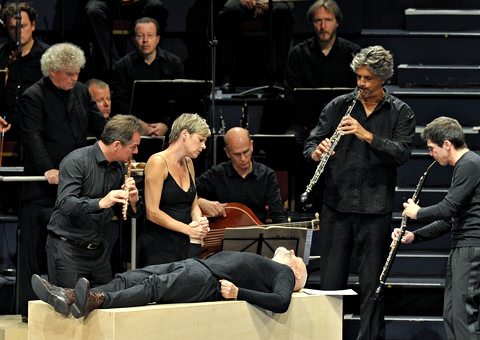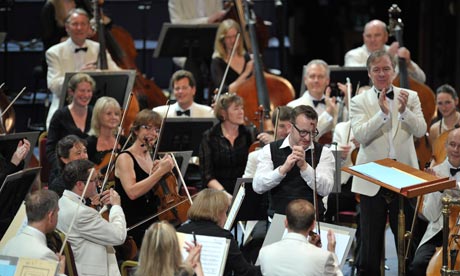Standing alone under the glass-and-iron canopy of the Royal Opera House’s Paul Hamlyn Hall, the American mezzo-soprano Joyce DiDonato is in full dramatic flight: winking, grinning, pouting, flirting, twirling, giggling. It’s a lesson for the photo-phobic: always give your all, even to an inanimate camera lens. The Observer’s photographer makes one last request and it doesn’t sound simple: would she lie down on that sofa over there so he can snap her from the gallery above? Furniture is rearranged. They’ve already had an hour. Inwardly I’m an emoji scream. DiDonato is right there, splayed out Hollywood-starlet style, shoes on, off, hand this way, arm flung back, patience personified. When the shoot is over, she says how much she enjoyed it – an unheard-of response from a madly busy international opera star, just out of a long day’s rehearsal.
As we walk through the ROH’s backstage warren to a private room to talk, she’s instantly in offstage mode, conversational, candid, warm, funny, reflecting on the day’s rehearsal. “The mood was black. I’ve got to shake it off,” she shudders, describing not the working atmosphere but aspects of Handel’s Agrippina (1709), in which she sings the title role in a new production for the Royal Opera by Barrie Kosky. This co-production with Bavarian State Opera, Munich, and Dutch National Opera is conducted by Maxim Emelyanychev in his house debut.
DiDonato’s character, the wife of the Roman emperor Claudius, is one of opera’s greatest political operators. Having recorded the work for future release, and sung it at the Barbican and elsewhere, DiDonato is steeped in it. Supreme as an actor as well as a singer, she totally inhabits every role. “Agrippina feels like the most modern drama, helped by the fact of Barrie’s production being timeless. I’ve got plenty of role models in mind – strong, wounded, slightly broken women. Robin Wright in House of Cards. Julia Louis-Dreyfus in Veep. Or, though she wasn’t villainous, Hillary Clinton 20 years ago – the smart, super-intelligent, suffering wife. It’s easy to say Agrippina’s wicked, power-obsessed. But she has no choice, no place in society other than being by the side of her husband. There are definitely times, in the crowd scenes, when I feel like Melania Trump: the cameras are there, darling.”
The previous week, on Twitter, DiDonato had described the air in the rehearsal room not as black, but blue. “Ha, yes. That was about swearing at the difficulties of learning the part. It’s the densest, most elaborate, largest Italian text that must exist in opera. Agrippina has so much information to impart, so many things to resolve. And she’s three steps ahead of all the useless men around her. It’s constant information, manipulation, plotting and resolving. The story unfolds like rolling news today. And I keep saying, this is genius. How did Handel know the human psyche so profoundly? He’s the composer who’s taught me most. I’d put Agrippina up there with Richard III.”
Born Joyce Flaherty in Prairie Village, Kansas, in 1969, the sixth of seven children in an Irish-American family, DiDonato was immersed in music from the start. Her father, a local architect, directed the church choir; her mother was the organist. Joyce expected to become a music teacher, and wrestled with her conscience when the pull of a professional singing career proved irresistible. “My childhood was quite strict. My parents were very observant Catholics. It was your duty in life to find your vocation and serve God. I thought mine was to teach. I saw poverty, abuse, need, in schools. How could I square this with the enormous fun, the selfishness, of performing? My dad, who I was really close to, said something so wise: ‘You know, Joyce, there is more than one way to teach…’ That gave me permission to go to the dark side. I still want to feel I’m in service.”
This sense of responsibility, and that instinct to teach, is perhaps why she spends so much time giving masterclasses, online and in person. Keenly alert to issues of social and political justice, DiDonato’s most personal project so far has been In War and Peace: Harmony Through Music, a themed album of baroque arias by Purcell, Monteverdi and others. It was her response to the terrorist attacks in Paris in 2015. “We’ve taken it across the world – Istanbul, Moscow, Beijing just steps away from Tiananmen Square, Abu Dhabi in front of sheikhs and diplomats – all with this identical message of peace.” She will end the tour at the Kennedy Center, Washington DC, in November. “I mean, how radically different is the world from when I launched this in November 2016, six days after Trump was elected? I’m a musician, a performer, but I’m a citizen. I’m in a privileged position. I understand that. I’m trying to find the right balance between being an activist and reminding everyone of the joy of music.”
To that end she works with inmates at Sing Sing, a maximum security prison in New York State, as part of Carnegie Hall’s outreach programme. The experience, apart from anything, has helped her interpretation of Sister Helen Prejean in Jake Heggie’s opera Dead Man Walking, about a convicted murderer on death row. “I want everyone to understand how transformative this stuff – opera – can be. As long as there’s context, as long as you take people by the hand, they can find a way into this unfamiliar world. I went into Sing Sing and sang a bit of the Hallelujah chorus. All the men joined in, they knew the tune. Then I said OK, I’m going to sing some more music by the guy who wrote that – Handel.”
She chose Piangerò from Giulio Cesare. “I said, this is Cleopatra, Queen of the Nile, and she’s going to cry, then in the middle section she’s going to swear revenge, and get the guy who took the man she loved. I got to the middle bit, all ferocious. And they started shouting out: ‘Get him, make him pay!’ They completely got it, viscerally. When I came back to the weeping, you could hear a pin drop… I stood there thinking, screw anyone who dares to say opera’s not relevant. You don’t know what you’re talking about.”
DiDonato’s career was relatively slow to take off. In her late 20s she revamped her vocal technique. A youthful marriage ended in divorce, as did a later one, but she kept her first husband’s name. Nicknamed the Yankee Diva and singing in many US regional opera houses, such as Houston Grand Opera, her star rose rapidly in the 2000/1 season with her debut at La Scala, Milan, quickly followed by other European houses including, in 2003, the Royal Opera House in Janáček’s The Cunning Little Vixen. Since then she has returned many times to Covent Garden, notably in works by Mozart, Donizetti and Rossini (singing in Il barbiere di Siviglia with her leg in plaster after an onstage fracture).
“Early on, it was clear my voice was suited to lighter repertoire – Handel, Mozart, Rossini – and gradually and carefully I’ve broadened that out, always returning to Handel. That feels like home base.” She has the clarity, flexibility and agility this music needs, leaving the purity of the vocal line intact, as well as the ability to drop to nothing, then expand thrillingly. “I love the challenge of asking my voice to serve the emotional temperature. It has to be demonic and seraphic. If you can crack open a heart – and I know this sounds a bit fluffy – and make it harder for someone to go to bed at night and switch off, that’s the power of music. Every human being, rich or poor, deserves that experience. It’s up to us to make it available to them.”
She credits patrons and sponsors, too often ignored by artists, with helping that process. “They don’t tend to get fan letters. I’ve shared some of mine with them. They are participating, in some cases, truly, in an act of salvation – there’s my Catholic upbringing speaking. One person, and there have been others, wrote to me: ‘I was ready to take a handful of pills. Then [Handel’s] Ombra mai fu came on the radio and I couldn’t do it. I’m still here.’”
With as full a diary as ever, DiDonato spends as much time as possible in Spain with her partner, a ballet dancer, and his two school-aged sons “who I love to bits. I don’t have a Mediterranean cell in my body – I’m Irish, Irish – but I sure identify with that way of life. I’m at the point where I know how to get off the hamster wheel. This business is pretty frenetic. I think I’m in my 21st season – I don’t keep track. I just turned 50, I feel great. I want to enjoy it while it’s here.”
The glamorous diva life has plenty of appeal, but only up to a point. “After six weeks in London or New York, I need nature, simplicity. I dig the garden, watch the tomatoes turn red. It’s as if I’ve returned to my Kansas roots.” Does she listen to music off duty? “You bet. Bach in the morning. Choral music. Or Latin, Cuban, Brazilian, Ella Fitzgerald, Chet Baker, Nina Simone… No opera. That puts me in work mode. We just did a two-week road trip on the west coast in a pickup truck and went from Seattle to LA listening to 70s music all the way. It was a blast. If it’s good music, its good. The louder the better.”
Has she any career endgame in mind? “Long ago I made a promise to myself. You do this to full capacity with the most joy you can. When you’re done, walk away. Because I’ve given myself that freedom, I can really enjoy that moment when I’m on stage singing Agrippina. And I can enjoy it when I’m driving the pickup truck with my amazing three boys, or singing to myself in the garden.”
We’ve talked a long time. Joyce DiDonato hasn’t once looked at her watch or made one of those you’ve-had-enough-of-my-time wriggling gestures. We stop only because the person looking after us has to go home. “I just try to make the most of everything and live in the moment. That seems to work. I don’t resent a thing.”
Agrippina opens at the Royal Opera House, London, on 23 September and runs until 11 October








